- Home
- William Shatner
Zero-G Page 4
Zero-G Read online
Page 4
“I love formies,” Kristine said. “I put Nicky and Plug Mitchell in a story about volcano divers trying to stop Vesuvius and its spawn, Vesuvius Jr., from erupting. It was very exciting.”
“Did they succeed?”
“Plug always succeeds in my formies.” She scrunched her face. “I don’t like downers. There’s too much of that in life.”
“But you’re so young. You should be happy.”
“One day,” she said. “One day I’d like to be as happy as you seem to be.”
Lord smiled pleasantly. He had no business judging youth; his parents didn’t understand a wide swath of things when he was a kid, from video games to his wanderlust to his loneliness. He turned her attention back to the crowd.
“Do you know that standing here, right here, you can see so much of what’s Machiavellian down on Earth,” Lord said, sweeping a hand across the room.
Kristine’s IC fed her a brief biography of Machiavelli but she pushed it away; she didn’t want to miss a word of what Lord had to say.
“How so?” she asked.
“I saw you notice the Mexican general,” Lord went on. “He’s Arturo Hierra, one of the few frontline survivors of the 2019 WON.”
“The War on Narcotics we helped them wage?”
“Ssh,” Lord jokingly suggested. “It’s still a big sore spot among the Americas. Our southern neighbors think we did it just to occupy Mexico and create a buffer between them and the exodus from Central America.”
“Didn’t we?”
“Oh, in part,” he admitted. “But the world is more complex than that, than even the newtiae and news minutiae can convey.”
He was referring to the news minutia, the constant updates from multiple official, unofficial, and opinion sources, and to profiled futures, a complex series of algorithms used to predict the flow and interaction of events, which were often conflated with or misrepresented as fact. ICs were constantly filtering for personal preferences, but that selective skewing only added to the confusion as partisanship replaced any semblance of a classic education.
“Thankfully,” Lord went on, “Arturo is a big fan of the new Mexican economy it created. He’s also a fan of Ambassador Pangari Jones of New Zealand, according to my sources.”
“What about him?” she interrupted. “The sheik.”
“The Prince of Gambling,” Lord immediately identified. “Maalik Kattan. His family owns the Kasbah Casino on Palau.”
“The one that’s done up like in the Arabian Nights?”
“The very one. He used to be in oil, but when demand dried up in the twenties they were ahead of the curve on making the Pacific Rim the new playpen. Reportedly, he wants the Empyrean to be a gaming destination as well.”
“Will that happen?”
Lord smiled. “Where there’s money, there’s a way.”
“The bald guru?” she asked.
Lord grinned at the description. “He isn’t, but I’m sure that was the effect he was going for. That’s Birousk Rouhani, the leader of the Julijil movement.”
“The unity cult,” she said.
“Accent on the ‘cult,’ ” he said. “That fellow has been trying to erase global borders with himself filling the power vacuum. He’s been trying to convince our government that Julijil is our best friend in Pan-Persia, the only plausible counterbalance to the region’s religious radicals and warlords.”
Pan-Persia was the name of the state created by Afghanistan, Iran, and Pakistan when they were excluded from the Middle East Confederacy in 2021. Kristine hadn’t been there and didn’t know much about the origins, only knew that factional violence still plagued the region and was constantly being hammered down by the Pan-Persian Occupation Forces.
“Are they a solution?” she asked.
“Zealots only form alliances when they want to expand, not share, their power,” he said. “So I’m wary.”
Kristine took a moment to think about that before moving on to a large, powerfully built figure.
“That’s Ziv Levy,” Lord said, “the most successful and influential CHAI on or off Earth. Has his own private shuttle, no transfer required.”
Kristine’s eyes widened. “Him?” She almost raised a pointing finger but stopped herself. “He’s a cyber-man?”
“Cybernetic Human Abstract Individual,” Lord corrected. “Proudly indistinguishable from so-called biologicals. Israeli scientists have made him their poster boy—their most remarkable prosthetic human-computer interface.” His voice grew even quieter, and his grin thinned. “There’s a rumor the Mossad has also made him their most remarkable agent. But I won’t say any more.” He tapped his left hip.
“I don’t understand,” she said, looking at his waist.
“The Israelis manufactured my CHAI leg, hip to knee inclusive. We don’t think it’s bugged, but one never knows. Jerusalem is very clever about such things.”
Kristine wasn’t sure whether or not he was joking. That could be why she liked him so much: maybe something so serious should not be taken so seriously.
“Our Indian friend is Dr. Vishnu Chadha,” Lord continued, “who is being promoted by everyone including himself as a modern-day Gandhi—the one man of science to lead his broken populace from the shadow of social collapse and military bankruptcy into the new frontier of space.”
“Do you think he can?”
“It’s possible,” Lord said, “as long as he remains true to the vision and not the visionary.”
That left only one wolfish shark she was curious about amid the brass and diplomats. Colonel Franco had been talking to him almost since he left her. The black-eyed, marble-faced man. Sam Lord and the shapely young blonde looked at him in concert.
“He is Yegor Golovanov,” Lord said, his voice mingling respect and derision. “ ‘Go-Low’ for short. He’s the best and worst example of the power and peril represented by—”
That was as far as he got. Suddenly another voice—a sharp, urgent one—cut in from behind them.
“Sir,” a woman said quietly, “may I see you a moment?”
THREE
KRISTINE LOOKED AROUND for the source of the soft, modulated interruption. She saw no one until Lord turned his head slightly.
Directly behind him, like a shadow, was a woman who looked about her own age. The new arrival had sharp brown eyes set in skin that was a smooth, lustrous sienna—space-prepped, Kristine suspected from the sheen. Her shoulder-length black hair moved as if it were deep in still waters. The young woman was wearing the same kind of tunic as Lord with the same 0G pin.
“What is it?” Lord asked the new arrival.
“A PAd, sir.”
Lord’s expression lost a little of its pleasant relaxation. “Go ahead.”
The woman glanced at Kristine. The look was brief, but long enough to convey disapproval.
“Ms. Cavanaugh was cleared to be up here, Adsila,” Lord said. “She can hear a public advisory. Go on.”
Nonetheless, the new arrival leaned a little closer to Lord, and Kristine had to listen carefully.
“Less than ten minutes ago, two hundred kilometers of Japan’s northeastern coast were destroyed by a wall of water,” Adsila said. “Point of origin was the north Pacific.”
Lord was seemingly impassive when he heard the news, but Kristine noticed his eyes flit briefly, protectively, toward Earth as he switched on his IC. Immediately, the feed from Adsila’s IC created a translucent download in Lord’s field of vision. From the identifying stamp, Lord saw that it was a SecD view from ten thousand kilometers above Earth. Only intelligence services had authorization to view images from the worldwide cooperative of security drones. Even if Kristine’s IC were on, she would not be able to see what Lord was seeing.
What the Zero-G leader saw didn’t seem to make geologic sense. The region had a restless suboceanic hist
ory, but the sea did not withdraw and surge back like a tsunami. One moment the water was at rest; the next instant it reared up like a roped stallion, remained upright, and moved west, crushing the coast. What struck him, in particular, was that the water didn’t rain back down—not even droplets. Rising that high, the natural currents and thermal influences of the air should have impacted it. It was as if the sea had been bonded to itself somehow, molecule to molecule.
“How far inland?” Lord asked.
“An average of six kilometers before it just collapsed and washed back,” Adsila went on. “Every town and city from Hachinohe to Kamaishi was obliterated. But that’s not the only thing.”
The view shifted to a JORO recording from atop one of the great rock projections that dotted the Sanriku Coast. It showed the top of the incoming wall. The crest was more like a mane, strands of water spinning upward and attenuating just below the cloud line.
“Distress calls from shipping?” Lord asked.
“Not a one,” Adsila replied. “We’re getting reports of dozens of missing vessels from freighters to fishing boats as well as four private and one commercial suborbitals.”
“But no mayday reports.”
“None, sir.”
Lord’s eyes found Adsila’s through the virtual image. They both knew the same thing: that this was not a natural event, and the “public advisory” would soon have a “private intelligence” component.
“I’ll be at the comm in a few minutes,” he said. “And yes,” he added, answering her insubordinate gaze, “I’ll leave the IC on.”
The woman turned and left with a parting glare at Kristine. The companion and Lord watched her go.
“Adsila Waters, my number two, and chief data analyst,” Lord explained.
“If you have to go, Director Lord—”
“I do, though I’m lucky to have a very able team.” He raised and wriggled a finger, indicating the IC area around his head. “That’s why I’m able to keep this off. Otherwise, it would be a flood of data—‘O, that way madness lies; let me shun that.’ ”
“King Lear,” Kristine said.
Lord grinned as he leveled the finger toward her. “You cheated. I saw it in your eyes.”
She flushed slightly. “Professional necessity,” she said apologetically. “I always have my Party Hat on.” Kristine was referring to the IC function that monitored cocktail conversations, annotated them, and floated appropriate bons mots into her field of view.
“Don’t be embarrassed,” Lord said. “The important thing is you know that line now, and its source.”
“True, but—”
“But nothing. My impression of you as bright and engaging has not changed.” He leaned forward conspiratorially. “Besides, you and I both know there’s no such thing as an honest cocktail reception.”
With that, Lord put his hand out. She took it and held on.
“Do you think—would it be possible to see you after your briefing? A tour?”
Lord withdrew the hand reluctantly. “I don’t know. Earth may need our eyes and ears just now. Planning even a social meeting presents challenges in my business.”
“I understand,” she said, smiling sadly.
“I’ll give it my best,” Lord said.
Though nearly sixty years separated the two, Lord had long ago learned what society was just understanding, what the fetal engineering that created pan-genderism had emphatically expressed: that the body, whatever age, whatever sex, was a tool that served the soul. Therein—not age or gender—lay the true measure of a person.
As Lord turned to go, he saw Kristine tense. The young woman’s IC buzzed with a proximity alert. Exogenous technology had been developed by America’s Homeland Security in 2030 to warn law enforcement of anyone manifesting physiological signs of hostile intent. Kristine dimly recalled the uproar, when she was five, about whether children should be given the technology to alert them of bullies or predators or whether it forced them to grow up too fast. Now it was standard IC software.
Lord didn’t know Franco well, but he knew him well enough. The man seemed unusually tense. Lord also noticed Kristine’s uneasiness and lingered long enough to type the air. He’d never quite gotten the hang of virtual gestures, and had a manual interface that allowed him to operate his IC with real ones if he wished. As he had explained it to his tech agent, Michael Abernathy, he liked people to know when he was talking about them. Besides, he wanted his eyes to remain on Franco.
“I’m giving you run of the public area of the station,” Lord told the young woman before he turned to follow Adsila. “Your SimAI will guide you.”
“Thank you,” Kristine said sadly as he strode away.
Lord’s back was already facing Franco as the Defense Intelligence Agency officer sidled up to her.
“Enjoy your time with His Lordship?” he asked as he slugged down the last of his bourbon.
“He was pleasant to me,” Kristine answered carefully, not wanting to offend her employer. She didn’t know whether Franco was upset about this or something else; ExoTech only presented data, it didn’t contextualize.
“Lord is an antique, out of place and out of sync,” Franco said as he watched the director go.
“Then why is he up here?”
The colonel looked at her. “Two agencies wanted a piece of this very exclusive real estate and the CIA lost. Or rather, they took a tactical retreat—provided the FBI agreed to send Lord.”
“Because they thought he’d fail.”
Franco nodded. “Which will make it easy for them to take and hold the high ground when his two-year mission is up in ’52, a view that’s backed by every profile metric in their arsenal . . . and by every bet I took back there at the reception.”
Kristine bristled at that but was careful not to show her contempt. “So why did the FBI go along with the appointment?”
Franco shrugged. “To buy time, I suppose.”
“For—?”
“Prayer?” he suggested. “They’ve got two years to hope he doesn’t muck it all up.” He noticed the time on his IC. “Let’s get out of here,” he said. “I have better things to do than talk about a has-been.”
Away from the reception, Lord quickened his pace toward the Zero-G command center.
The comm was located along Radial Arm Two, in a microgravity center that simulated the pull of Earth. The location also afford them privacy, away from the central column of the Empyrean. There, several floors above the FBI installation, was the pride of the space station: the Empyrean command center. Dubbed the Drum, the NASA-run headquarters was a squat, wide cylinder located in the center of the space station. Like each of the Zero-G team members, Lord had only been there once, during station orientation; up here, NASA and the FBI were independent and fiercely—at times, combatively—protective of their respective autonomy. The only thing Lord had in common with Station Commander Curtis James Stanton was that they had both departed the reception, quickly, at the same time.
The Drum was larger and better equipped than Lord’s command center. Stanton’s base had a permanent staff of nine monitoring ship functions and personnel as well as the external environment, watching everything from sunspots to orbital debris. Because the Drum was located at the zero-gravity center of the space station, everyone free-floated among the hovering displays and the tall, wide, “all-seeing” windows. Made of moving microvoxels, they allowed crewmembers to observe and magnify a wide array of locales. The adjustments were made manually, by pinching different sections of the glass and pulling the view apart, expanding it. External mirrors allowed views of the Empyrean that were outside the direct line of sight. These windows provided clarity and size far beyond that afforded by the smaller IC. Every section of the station was visible from here, from the uppermost antennae to the docking ports to the lowest radiation sensors.
One wedg
e-shaped segment of the Drum was electronically scrambled to the rest of the staff so that information could not be accessed from without. This was earmarked for “special communications.” Because personal ICs picked up all crucial data from NASA and received messages from Earth, this section had only two functions, both quite different and distinct. One—the publicly announced function—was to listen for extraterrestrial life. The other—not mentioned in any of the publicity materials—was run by NASA’s highly secretive Space Intelligence Corps. The SIC had been established to collect intelligence for any government agencies that were willing to work through NASA and pay for the information. Most were, with the notable exception of the FBI. The agency had historically preferred human interaction, on Earth; now they had their own presence in space, their own secret methods of gathering intel.
The kind of functions performed by the SIC ranged from spying on high-profile guests, of which there were soon to be many, to plugging into the satellites of other nations. Given their orbital proximity to most satellites, and lack of distortive atmosphere, NASA was very effective in this function. The SIC was personally overseen by Stanton, who ran it through his trusted lieutenants, Lajos Beck and Zoey Kane.
As Lord moved quickly toward the FBI’s comm, he passed through one of the roomier corridors on the station. In this slightly curved concourse, haptic-feedback touchscreens covered walls, floors, and ceilings. The volumetric, magnetically contoured microvoxels displayed not only the image but the physical texture of Hinoki cypress, rice paper, and bamboo. The whole concourse had the look of a nineteenth-century Japanese village, and Lord wondered if this might be some tribute to the lost coast after the disaster—maybe even an automated gesture of solidarity.
During Lord’s transit, his public IC newsfeeds told some of the story but not all of it. He saw the first, shrieking headlines: “HIGH” SEAS HELL! and GLOBAL WARNING?
Preliminary estimates were that at least a quarter million souls had been washed out to sea. Lord blocked the torrent of public feeds and followed only the stream coming to him from Adsila. One of the many things he had learned as a fighter pilot—something that was no longer practiced, let alone taught—was the importance of a mission. A bombing run, a strafing pass, a takeoff or landing: if you were distracted by glare, by chatter, by a girl you saw at the airfield or spent time with the night before, by any piece of nonessential heads-up data, you increased the likelihood of being off-target, off-time, off your game. You risked failure.

 Man O' War
Man O' War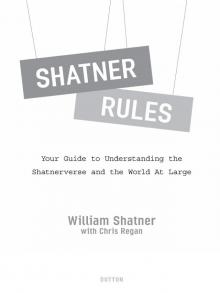 Shatner Rules
Shatner Rules Leonard
Leonard Captain's Glory
Captain's Glory Captain's Glory зпвш-9
Captain's Glory зпвш-9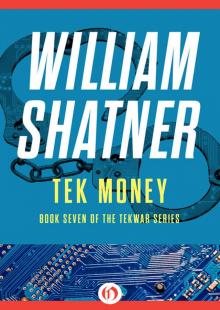 Tek Money
Tek Money Spirit of the Horse
Spirit of the Horse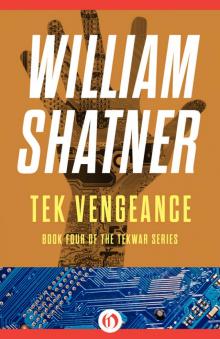 Tek Vengeance
Tek Vengeance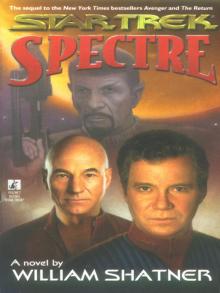 Spectre
Spectre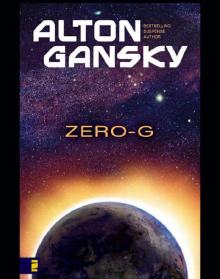 Zero-G
Zero-G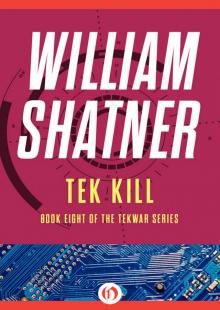 Tek Kill
Tek Kill Collision Course
Collision Course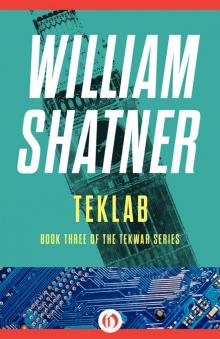 TekLab
TekLab Up Till Now
Up Till Now Captain's Blood
Captain's Blood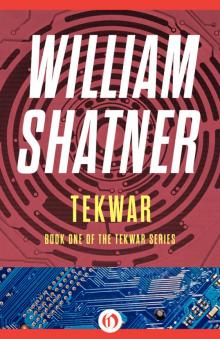 TekWar
TekWar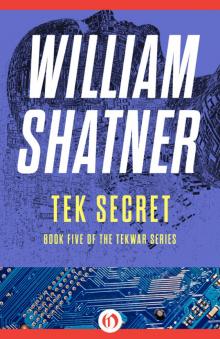 Tek Secret
Tek Secret Captain's Blood зпвш-8
Captain's Blood зпвш-8 Captain's Peril
Captain's Peril Live Long and . . .
Live Long and . . .